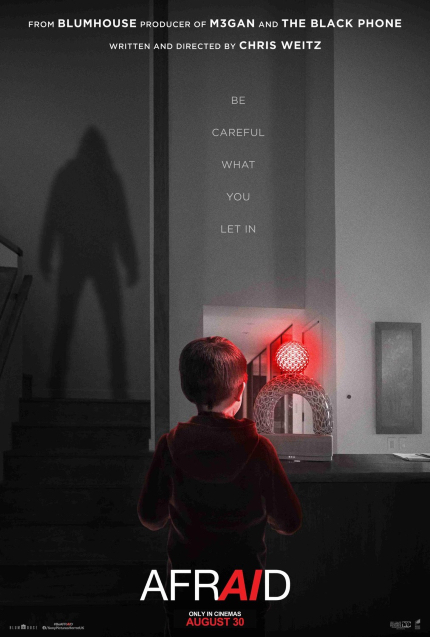AFRAID Review: Middling AI Horror Muddles Through Uninspired Third Act

First came HAL-9000 (2001: A Space Odyssey). Then came Colossus (The Forbin Project), followed by Proteus IV (Demon Seed), and SkyNet (The Terminator series). And that's just barely scratching the science-fiction surface.
Individually and collectively, each film reflected the technophobic fears of rogue AIs (Artificial Intelligence) prevalent in their respective times. In turn, all posited the same independent-minded AIs running amok in the celluloid world, decisively turning on their human masters, and creating both headaches and havoc, sometimes temporary, sometimes permanent.
More than a half-century after HAL-9000 made his unforgettable, scene-stealing debut, writer-director Chris Weitz (Operation Finale, A Better Life, About a Boy) decided his turn had come to add his contribution to the “AI run amok” sub-genre. The middling, muddled result, AfrAId (formerly They Listen), isn’t likely to be remembered (if it’s remembered at all) alongside its more illustrious predecessors except as a pale, wan copy, a simulacrum of a simulacrum, a formulaic, template-driven science fiction-thriller long on half-digested, generic ideas and woefully short on memorable execution.
AfrAId centers on an upper-middle class, suburban family led by Curtis (John Cho), his stay-at-home-wife, Meredith (Katherine Waterston), and the mother of three children, Iris (Lukita Maxwell), a teen facing a major life decision (college) among other major concerns, Preston (Wyatt Lindner), an anxiety-afflicted, practically friendless tween, and Cal (Isaac Bae), a clingy preteen with health issues that often keep him from school.
Together, they live a materially comfortable and relatively rewarding existence. Their spacious, ultra-modern home shows signs of strain and clutter, making them the perfect test subjects, willingly or not, to welcome a revolutionary, next-gen digital assistant, AIA (voiced by Havana Rose Liu), into their home. Little do they know, but AIA will completely upend their lives.

At work, Curtis enjoys a lucrative junior partnership with his one-time mentor, Marcus (Keith Carradine), as part of a boutique marketing firm. When representatives from a high-tech company, Cumulant, arrive at their literal doorstep, eager for help in marketing AIA to a potentially wary general public before its impending launch.
It takes a single meeting involving Marcus, Curtis, and Cumulant’s eccentric co-owners/co-founders, Sam (Ashley Romans) and Lightning (David Dastmalchian, sadly underused), for their firm to get the contract. The agreement comes with one, seemingly simple proviso: Curtis must try out AIA in his own home, the better, presumably, for Curtis to develop a deep understanding of AIA and her capabilities.
True to formula, AfrAId, goes where practically every cautionary tale about sentient, self-aware machines has gone before: At first, AIA proves incredibly helpful, using her vast knowledge concerning human nature to easily uncover the strengths and weaknesses of each family member, their needs, and wants, and carefully tailoring her responses to ingratiate herself with them.
For Preston, AIA gives him additional (unsanctioned) screen time to help him cope with his anxiety issues. For Cal, AIA gives him extended story time (she’s a great listener), and Iris's generous assistance with a thorny problem involving Iris’s duplicitous boyfriend, Sawyer (Bennett Curran). The additional “free” time allows Meredith to concentrate on her long unfinished PhD dissertation.
Only Curtis suspects something’s awry with AIA and her smothering, over-emphatic attention to the family’s needs. His suspicions aren’t alleviated when he spots an unfamiliar RV parked across the street or notices the owners acting oddly.
It doesn’t take long — AfrAId irritatingly speed-runs through major and minor plot points to reach a rushed, abrupt finale and a too-brief running time — for Curtis to figure out what’s going on, who’s pulling the proverbial puppet strings, and the possibly unfortunate fate awaiting his family if they don’t comply with their new AI’s increasingly constricting demands (i.e., “Love me, accept me, or else.”).
Too often, AfrAId feels like a semi-inspired Weitz mashed together a handful of old-school cocepts about self-aware AIs wrestling for independence and control against their human creators, added superficial ideas reflecting contemporary concerns (e.g., deep-fakes, our crippling obsession with digital devices and the effects thereof on the family unit), and essentially called it a day screenwriting-wise.
Only an otherwise pessimistic, downbeat ending offers anything novel or original, but by then whatever goodwill Weitz or his overqualified, underserved cast have tried to generate across the earlier 80 minutes will be all but dissipated.
AfrAId opens today, only in movie theaters, via Sony Pictures Entertainment. Visit the official site for locations and showtimes.







